Old Testament
Genesis Exodus Leviticus Numbers Deuteronomy Joshua Judges Ruth 1 Samuel 2 Samuel 1 Kings 2 Kings 1 Chronicles 2 Chronicles Ezra Nehemiah Esther Job Psalms Proverbs Ecclesiastes Song of Solomon Isaiah Jeremiah Lamentations Ezekiel Daniel Hosea Joel Amos Obadiah Jonah Micah Nahum Habakkuk Zephaniah Haggai Zechariah MalachiJob 10:9 Similar Verses
Job 10:9 Cross References
Remember, I beseech thee, that thou hast made me as the clay; and wilt thou bring me into dust again?
Uncover the Rich Themes and Topics of This Bible Verse
Listed below are the Bible themes associated with Job 10:9. We invite you to explore each theme to gain deeper insights into the Scriptures.
Job 10:9 Cross Reference Verses
This section features a detailed cross-reference designed to enrich your understanding of the Scriptures. Below, you will find carefully selected verses that echo the themes and teachings related to Job 10:9 KJV. Click on any image to explore detailed analyses of related Bible verses and uncover deeper theological insights.
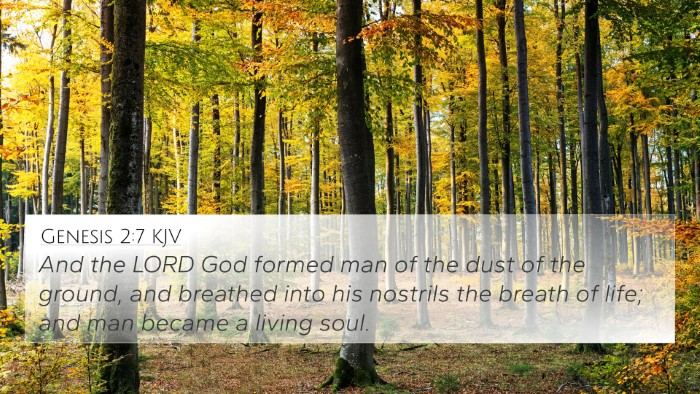
Genesis 2:7 (KJV) »
And the LORD God formed man of the dust of the ground, and breathed into his nostrils the breath of life; and man became a living soul.
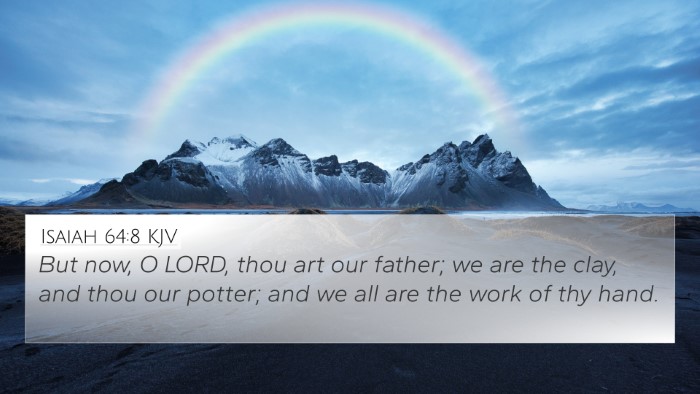
Isaiah 64:8 (KJV) »
But now, O LORD, thou art our father; we are the clay, and thou our potter; and we all are the work of thy hand.
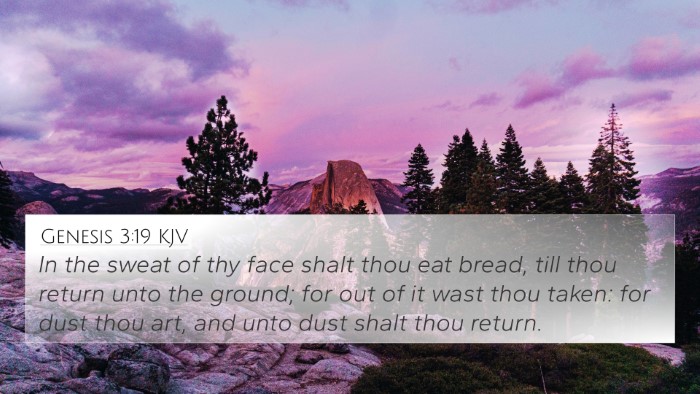
Genesis 3:19 (KJV) »
In the sweat of thy face shalt thou eat bread, till thou return unto the ground; for out of it wast thou taken: for dust thou art, and unto dust shalt thou return.
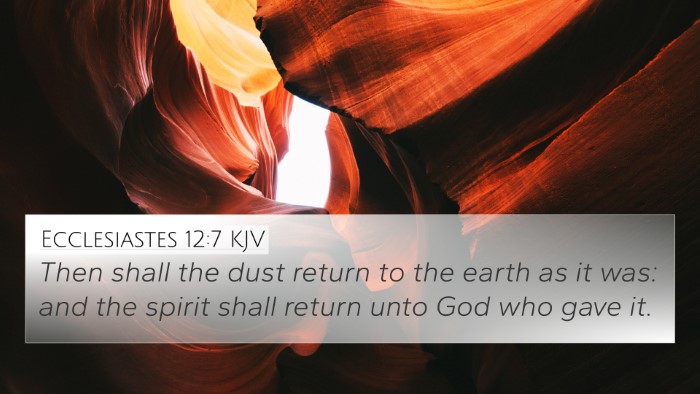
Ecclesiastes 12:7 (KJV) »
Then shall the dust return to the earth as it was: and the spirit shall return unto God who gave it.

Jeremiah 18:6 (KJV) »
O house of Israel, cannot I do with you as this potter? saith the LORD. Behold, as the clay is in the potter's hand, so are ye in mine hand, O house of Israel.
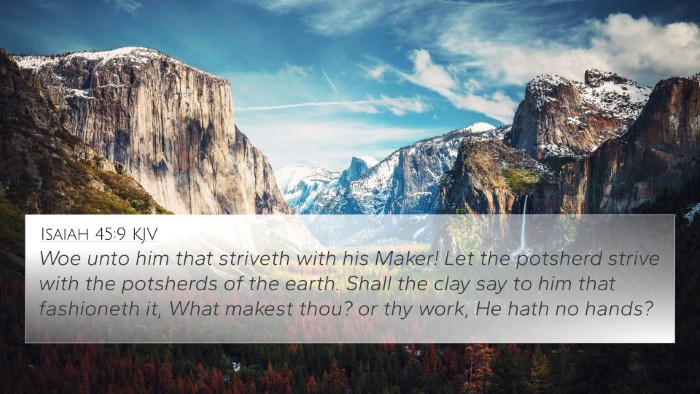
Isaiah 45:9 (KJV) »
Woe unto him that striveth with his Maker! Let the potsherd strive with the potsherds of the earth. Shall the clay say to him that fashioneth it, What makest thou? or thy work, He hath no hands?

Psalms 106:4 (KJV) »
Remember me, O LORD, with the favour that thou bearest unto thy people: O visit me with thy salvation;
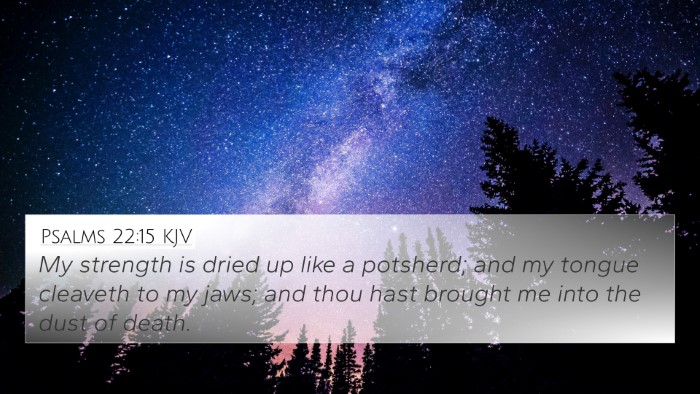
Psalms 22:15 (KJV) »
My strength is dried up like a potsherd; and my tongue cleaveth to my jaws; and thou hast brought me into the dust of death.

Psalms 25:6 (KJV) »
Remember, O LORD, thy tender mercies and thy lovingkindnesses; for they have been ever of old.

Job 17:14 (KJV) »
I have said to corruption, Thou art my father: to the worm, Thou art my mother, and my sister.

Romans 9:21 (KJV) »
Hath not the potter power over the clay, of the same lump to make one vessel unto honour, and another unto dishonour?
Job 10:9 Verse Analysis and Similar Verses
Understanding Job 10:9
The verse Job 10:9 states: "Remember, I beseech thee, that thou hast made me as the clay; and wilt thou bring me into dust again?" This plea from Job reflects his deep anguish and desire for understanding in the midst of his sufferings.
In contextual analysis, this verse illuminates Job’s struggle with his identity in relation to God. Job compares his creation to clay, emphasizing the idea of being shaped and formed by divine hands, reminding us of God's ultimate authority over human life.
Commentary Insights
- Matthew Henry highlights that Job is reminding God of His role as the creator and the fragility of man. Henry suggests that Job's lamentation is indicative of human mortality and vulnerability. He stresses how quickly humans can return to their former state, emphasizing the transient nature of life.
- Albert Barnes points out the profound rhetorical nature of Job's question. Job, in his affliction, is inquiring whether God, who made him from dust, would choose to return him to dust—signifying death. Barnes interprets this as an expression of Job's pain, demonstrating his struggle between understanding God’s justice and his own suffering.
- Adam Clarke provides a detailed historical overview, specifying that Job’s statement serves as a reminder of humanity's origins from dust as stated in Genesis 2:7. Clarke delves into the theological implications of creation and destruction, suggesting that Job’s feelings resonate with the common human experience of suffering and mortality.
Related Bible Verse Cross-References
- Genesis 2:7 - "And the LORD God formed man of the dust of the ground, and breathed into his nostrils the breath of life; and man became a living soul."
- Psalm 103:14 - "For he knoweth our frame; he remembereth that we are dust."
- Isaiah 64:8 - "But now, O LORD, thou art our father; we are the clay, and thou our potter; and we all are the work of thy hand."
- Romans 9:21 - "Hath not the potter power over the clay, of the same lump to make one vessel unto honour, and another unto dishonour?"
- 2 Corinthians 4:7 - "But we have this treasure in earthen vessels, that the excellency of the power may be of God, and not of us."
- Ecclesiastes 12:7 - "Then shall the dust return to the earth as it was: and the spirit shall return unto God who gave it."
- Job 4:19 - "How much less in them that dwell in houses of clay, whose foundation is in the dust, which are crushed before the moth?"
Implications and Thematic Connections
The themes of creation, mortality, and divine sovereignty are richly interwoven throughout Scripture. By analyzing these connections, we see how Job’s lament in 10:9 resonates with broader Biblical themes.
Job's assertion reminds us that all humanity shares the common experience of being created from dust and returning to dust. The subsequent connections between Job's experiences and other scriptural texts enrich our understanding of suffering, purpose, and God’s creation.
Cross-Referencing Biblical Texts
Utilizing tools for Bible cross-referencing, such as a comprehensive Bible concordance or a bible cross-reference guide, can enhance understanding. By exploring the links between Job's plight and other scripture, individuals can grasp a fuller picture of God's relationship with humanity.
Finding Cross-References in Scripture
Analyzing Job 10:9 provides an opportunity to search for connections between Old and New Testament teachings. For example, the New Testament reflects on the fragility of human life in passages such as James 4:14, "Whereas ye know not what shall be on the morrow. For what is your life? It is even a vapour, that appeareth for a little time, and then vanisheth away."
The comparative study of Pauline epistles, particularly with themes of suffering and resilience, can also be beneficial. This verse alongside passages like Philippians 1:21 demonstrates an understanding of life through trials.
Conclusion
In summary, Job 10:9 serves not only as an individual lament but also as a profound reflection of humanity's shared experience of life and mortality. Through examining cross-references and their interconnections, we can uncover deeper theological truths and the nature of God’s relationship with His creation. For those seeking to explore these connections, bible reference resources such as concordances and cross-reference guides offer invaluable tools for deeper study.






